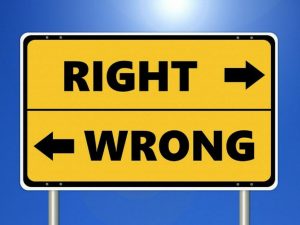Differences Between Religion And Morality: The link between religious perspectives and morals is explored at the intersections of morality and religion. Value frameworks for personal behavior are ubiquitous in religions, and they serve to help members in identifying what is good and wrong.
Morality and religion are not synonymous. Though religion may be dependent on morality and may even grow alongside morality, morality is not always dependent on religion, despite some people’s “near reflex assumption” to the contrary. Prior to the contemporary age of philosophy, it was widely accepted that religion is the undeniable foundation of morality, indicating that there can be no morality without religion.
This widely held and deeply ingrained belief that religion is a precondition for morality continues to be promoted today by scholars, who claim that “morality is impossible without belief in God,” and, who claim that “declining moral standards are at least partly attributable to the rise of secularism and decline of organized religion.”
Because several other modern and contemporary academics have argued with evidence that many religious ideas and behaviors have failed the test of morality, the argument that religion is neither required nor sufficient for morality no longer appears to be particularly strong.
This viewpoint challenges the long-held belief that morality has a divine origin: either God created man with moral sense or man learned about good and evil, right and wrong via religious teachings.
Despite the diversity of various faiths, the moral dilemma that our modern society is experiencing creates a stronger objection to religion’s effect on morality.
If religion has such a strong impact on morality, one could wonder why moral standards are being disregarded in our modern society, despite the extremely loud, clear, and consistent preaching of countless religious denominations in nearly every corner of our modern civilization.
Stil want to understand what it means to be morally right and to be religiously right? Keep reading this piece as we discuss the major differences between morality and religion.
Recommended: Relationship between psychology and sociology
Definition of Morality
Morality is a set of principles that allows individuals to live in groups and cooperate. It’s a society’s definition of “right” and “good.” Morality is the distinction between correct (right) intents, decisions, and acts from improper (wrong) intentions, decisions, and actions.
Morality can refer to a set of norms or principles drawn from a code of behavior from a specific philosophy, religion, or culture, or it can refer to a universal standard. Morality is often used interchangeably with the terms “goodness” and “rightness.”

Also see: Countries around the world where prostitution is legal
The Establishment of Morality
Morality isn’t a set of rules that must be followed. What is acceptable in one culture may not be in another. Morals are influenced by geographical surroundings, religion, family, and life events. Morals are developed in a variety of ways, according to scholars. There are, however, a few hypotheses that have acquired popularity through time:

a. In Freud’s Work, Morality And The Superego: According to Sigmund Freud, moral development happens when a person’s ability to put selfish needs aside is replaced by the values of essential socialization agents (such as one’s parents).
b. The Moral Development Theory Of Piaget: Jean Piaget looked at development from two perspectives: social-cognitive and social-emotional. According to Piaget, moral development unfolds in stages as children learn to adopt certain moral behaviors for their own reasons rather than just to stay out of trouble.
Also see: Advantages and Disadvantages of Being an Entrepreneur
c. The Behavioral Theory of B.F. Skinner: External factors shaped a person’s growth, according to B.F. Skinner. A youngster who is praised for being nice, for example, may treat someone with kindness again in the future because he or she wants to earn more positive attention.
d. Moral Reasoning By Kohlberg: Beyond Piaget’s approach, Lawrence Kohlberg offered six phases of moral growth. Kohlberg argued that an adult’s thinking stage may be determined by asking them a series of questions.
Recommended: Punishment For Drug Trafficking in Nigeria
Definition of Religion
Religion refers to a system of shared ideas and practices about the supernatural (and its relationship to mankind and the world), which are frequently institutionalized in prayer, ritual, scriptures, and religious legislation. These behaviors and beliefs are usually characterized in terms of a common canonical lexicon of ancient traditions, texts, history, and mythology.

Religious traditions frequently feature moral codes that explain the connections that a believer is supposed to nurture with respect to themselves, other believers, outsiders, and the supernatural realm since they are strongly rooted in specific cultural settings. Many religious traditions divide the world into two broad realms, one sacred and the other profane. Religious thinking and practice in this environment aim to demarcate and reify these two distinct domains via personal effort and/or collective ritual.
Also see: How to become a successful Lawyer in your jurisdiction
The most inwardly-directed kinds, such as early Christianity’s desert saints and Hinduism’s ascetics, would be on one end of this range. On the other hand, religious traditions that are deeply embedded in all elements of personal, social, and legal life, such as the medieval Catholic Church and some Islamic states’ theocratic regimes, can be found. All other religious traditions may fall somewhere in between these two extremes.

Also see: Differences Between Law and Morality
Differences Between Morality And Religion
1. Meaning: Without ignoring the numerous alternative definitions of religion, one might conclude that religion is a set of ideas and activities that acknowledges a bound relationship with a supernatural Being or beings. Religion is defined as man’s connection with a deity or divinity, in which the human being is the subordinate partner.
Morals and morality, on the other hand, are derived from the Latin term ‘mos’ (plural mores), which means ‘custom’ or ‘habit,’ and which is the equivalent of the Greek word ‘ethos,’ which likewise means ‘custom‘ or ‘habit.’
2. The Rationale For Practice: Religion is concerned with belief in God, deities, heaven, hell, angels, doomsday, good and bad luck, and so on, without any reasonable explanation or proof. All faiths believe in the presence of spiritual and supernatural forces that have the ability to influence human events and circumstances.
On the other hand, morality is distinct from purely personal preferences in that they require reasons, and in the absence of such rationales, they are merely arbitrary.

Also see: Differences Between Cost Accounting And Financial Accounting
3. Identification Or Conception: Morality is absolute—there is a universally and immutably true right and wrong, regardless of whether someone believes it or not.
Religion, on the other hand, has a well-organized structure. Religion cannot propagate itself without organization. As a result, religious groups spread their beliefs, rituals, and feelings.
4. Method: Many religions have sacred objects and places of devotion. Different faiths have their own holy items and places of worship, such as temples, churches, mosques, shrines, idols, crosses, Bibles, Korans, rivers, and so on, which are used to communicate with supernatural creatures.
A place of worship is not required for morality.
Also see: Causes of poverty in Africa: Major Reasons
5. Rituals: Rituals and ceremonies are used in religion. A man might alter his disposition to the better supernatural deities through these rites and ceremonies. Prayers, hymns, fasting, washing, incantations, anointing, a sprinkling of holy water, and other exterior rituals or rites are examples. Failure to complete these rites is sometimes deemed sinful and might jeopardize one’s connection with God.
On the other hand, morality is not based on rituals. Morality is the act of adhering to what is thought to be correct. Good and wrong might be defined according to an individual’s best interests or according to what God has decreed to be right and evil.
6. Signs and Symbols: Signs and symbols are used in religion. Sacred pictures, locations, or publications include these signs or symbols. Some of these symbols can also be demonstrated by gestures or verbal announcements, which provide the non-believer or non-initiate a religious significance that is hidden from them.
These uses of signs and symbols, on the other hand, are not considered morality. Human morality is humanitarian and empathizing, not just sympathizing.
Also see: How To Make Reading Fun and Interesting
7. Formation Of Sects: Sects are a fundamental feature of many faiths. Whether in Judaism, Christianity, Islam, Hinduism, or any other religion, sects form as a result of overzealousness, over piety, and fanaticism. There are several sects, each with its own set of religious doctrines and customs. These sects also propose various techniques for facilitating man’s redemption, as well as specialized worship processes.
In morals, the phenomena of sects that may be seen in religion do not exist.
Also see: Most Protected People In The World 2022 and Why
Conclusion
In current intellectual conflicts, the premise that religion is the wellspring of morality, which nonetheless retains power in moral theology, is no longer tenable. This statement does not imply that morality has nothing to do with religion, as some radicals may believe, but it does imply that morality is independent of religion. Morality may exist without the presence of religion. Morality may require religion to promote its values, just as religion may require morality to promote its ideals.
As a result, religion and morality are complementary rather than mutually incompatible. Morality and religion are complementary in the formation of a healthy personality as well as the construction of a peaceful, just, and equal society, despite the fact that their priorities, preoccupations, and component aspects differ and there is no definitional relationship between them.

Edeh Samuel Chukwuemeka, ACMC, is a lawyer and a certified mediator/conciliator in Nigeria. He is also a developer with knowledge in various programming languages. Samuel is determined to leverage his skills in technology, SEO, and legal practice to revolutionize the legal profession worldwide by creating web and mobile applications that simplify legal research. Sam is also passionate about educating and providing valuable information to people.